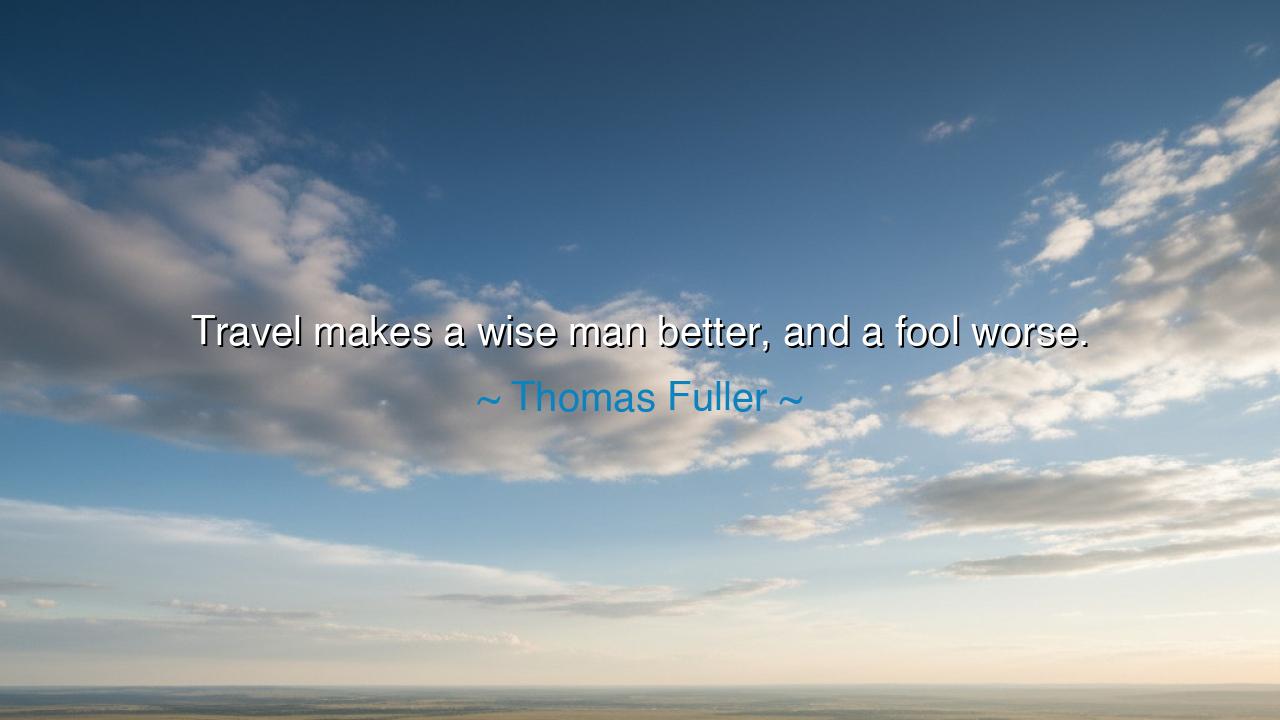
Travel makes a wise man better, and a fool worse.






Thomas Fuller, the English divine of the seventeenth century, once uttered with piercing simplicity: “Travel makes a wise man better, and a fool worse.” In these few words lies a principle as enduring as the mountains and seas themselves: the journey does not change what a man is at his core, but magnifies it. For the road is a mirror, showing not the world alone, but the soul of the traveler reflected in every river, in every city, in every stranger’s face.
The wise man goes forth in humility. When he beholds new lands, he learns. When he meets strange customs, he listens. He returns home with a mind enlarged, with prejudices burned away, and with treasures of knowledge that no thief may steal. The fool, however, goes forth in arrogance. He scorns what he does not understand, mocks what is different, and returns not enriched, but hardened in his ignorance. Thus travel becomes not the teacher but the amplifier—making the wise wiser, and the fool more foolish still.
The ancients understood this truth well. Herodotus, called the “Father of History,” traveled widely through Egypt, Persia, and beyond. He returned not with ridicule, but with stories that opened the Greek mind to the wonders of other civilizations. His wisdom allowed him to see that truth wears many garments. In contrast, countless conquerors—men like the Crusaders who marched into the East—saw only what they expected to see: heresy, barbarism, inferiority. Their journeys gave them not broader minds, but narrower ones. Thus history testifies: travel is no guarantee of greatness, but only the proving ground of character.
Consider Marco Polo, whose journeys to the court of Kublai Khan brought Europe visions of lands richer and stranger than they had ever dreamed. Because he traveled with the eyes of a student, not the tongue of a fool, he carried back tales that would inspire generations, even planting seeds in the mind of Columbus centuries later. The lesson is plain: when wisdom travels, it multiplies. When folly travels, it infects.
But Fuller’s words also serve as warning. Many believe that merely leaving their homeland will make them wiser, more cultured, more profound. Yet geography alone does not sanctify the spirit. To move the body without moving the heart is vanity. A man may sail across oceans, yet remain chained by prejudice; he may walk the streets of a thousand cities, yet learn less than one who sits humbly with a single teacher. The fool cannot escape himself by crossing borders—he carries his folly as surely as he carries his shadow.
The lesson, then, is luminous: prepare your soul before you prepare your luggage. Enter the world not as a conqueror, but as a disciple. Let every temple, every field, every face you meet become your instructor. If you are wise, the world will sharpen your wisdom as a whetstone sharpens steel. If you are foolish, the world will expose your folly and magnify it until it consumes you. Travel is the fire; the traveler is the metal. What emerges depends on what enters the flame.
Practical action follows with clarity. When you travel, do not boast, but observe. Do not scorn what is strange, but ask what it teaches. Keep a journal not of distances, but of lessons. Break bread with strangers, learn their words, honor their ways. Do not let your journey be a parade of vanity, but a pilgrimage of growth. For then, and only then, will you fulfill Fuller’s promise: travel will make the wise man better.
Thus Thomas Fuller’s words resound across centuries like the tolling of a bell: The road does not make the man—it reveals him. Take heed, O traveler, for the lands you walk will echo your soul back to you. Strive to be wise, and the world will crown you with greater wisdom. Persist in folly, and the world will engrave your foolishness deeper into your being. This is the eternal law of the road, the commandment of the path, the wisdom of the ages.






AAdministratorAdministrator
Welcome, honored guests. Please leave a comment, we will respond soon